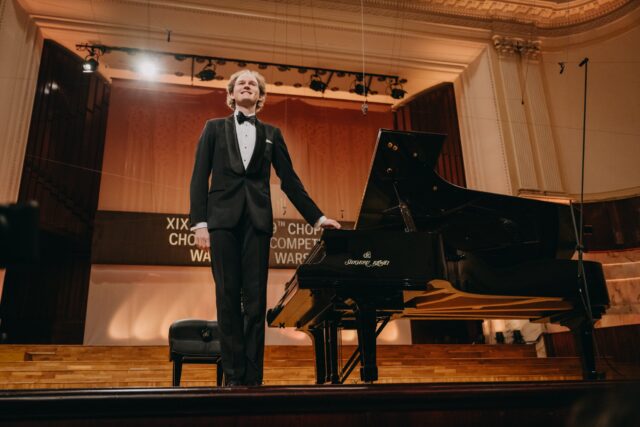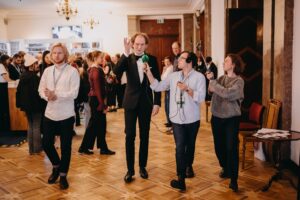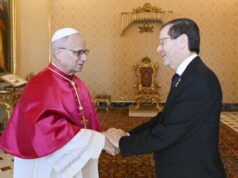
WARSAW, Poland — In the charged silence before his performance at the 2025 Chopin Competition in Warsaw, Polish pianist Piotr Pawlak did something both simple and profound.
Standing in the lobby of one of the most prestigious stages in the classical world — the Warsaw Filharmonic — moments before his semifinal performance Oct. 11, he reached for his rosary, made the sign of the cross and prayed.
Cameras caught that quiet moment, which has traveled virally since — a young artist bowing his head in prayer.
In conversation with OSV News, the 28-year-old pianist — already recognized for his poetic touch and musical intelligence — reflected on the gesture. “For me, it was absolutely natural,” he said. “I pray before every performance. I always ask for support, because what we do as musicians somehow exceeds our human capabilities. So even though I knew there were cameras backstage, I simply did what I always do. I don’t hide my faith, and I don’t hide that I always ask God for help.”
Pianists who take part in the International Chopin Competition are considered — even if young — the best in the world. Winning the competition opens a path for a global career.
Held every five years in Warsaw since 1927, it is one of the world’s most prestigious and demanding contests, devoted entirely to the music of Frédéric Chopin (1810-1849) — an iconic Polish composer exiled in Paris during the partitions of Poland.
Many of the greatest pianists — including Argentine “black panther of the piano” Martha Argerich, Pole Krystian Zimerman and Garrick Ohlsson, the first and only American to win the competition in 1970 and who is now heading the jury — gained global recognition through this event. It continues to draw millions of listeners and viewers around the world and is recently a YouTube phenomenon as all concerts are streamed live by the National Institute of Frederic Chopin.
Born in Gdansk, Pawlak is a Polish pianist celebrated for combining technical precision with emotional depth. He began piano studies at age 6 and also trained in organ and conducting. A graduate of the Stanislaw Moniuszko Academy of Music in Gdansk, he has studied since 2024 at the International Piano Academy Lake Como in Italy.
Pawlak has won top prizes at major competitions, including the fifth Maj Lind International Piano Competition in Helsinki (2022) and the 11th International Chopin Piano Competition in Darmstadt (2017), and has been honored at Chopin competitions in Beijing; Budapest, Hungary; and Kraków, Bydgoszcz and Warsaw, Poland.

He has performed widely across Europe, Asia, North America and Japan, appearing with major orchestras and at festivals. His playing is praised for clarity, expressive sensitivity and spiritual depth, making his performances both technically masterful and moving.
Prayer, for him, is also a way to focus and ground himself before entering the intensity of the stage. “Prayer helps in a very human way — to concentrate, to gather my thoughts before playing. It’s an important element for me,” he told OSV News.
Pawlak grew up in a Catholic home. “Faith was always present,” he said. “Especially my mother made sure to raise me that way. We went to church every Sunday; she taught me to pray.”
She also nurtured his musical path. “She cared about my musical development,” Pawlak recalled, “but it was I who decided, as a child, that I wanted to play. Seeing my passion, she supported me and found opportunities for me to grow. Later she encouraged me to work hard and be professional about it.”
Despite his busy concert schedule, Pawlak still finds time to serve at his parish church of St. Thérèse of the Child Jesus in Gdansk. “Even now, I sometimes play the organ at my parish,” he said. “We don’t currently have a permanent organist, so if I’m there and see that no one is at the organ, I go and play during Mass. Our parish priest often mentions it, so yes, everyone knows who’s playing. It’s always a joy to help in that way.”
Playing at Mass is very different from performing on stage. “On stage, I am, in a way, the center of attention — along with the composer and the work itself. It’s almost like a theater. But liturgical music is entirely different. Its purpose is to help people pray, not to distract them. It supports the singing and prepares the congregation for experiencing the liturgy. I still aim for the highest artistic level — that gives me joy — but the priorities in liturgical music are completely different.”
When asked about the spiritual dimension in classical music — especially in the work of composers such as Chopin, Johann Sebastian Bach and Wolfgang Amadeus Mozart — Pawlak said he agrees “there is a spiritual element.”
“People often tell me they are deeply moved by my playing, that they experience something spiritual, even religious, though the music itself isn’t explicitly sacred. Music touches our senses in a deep way, allowing us to reach the beauty of the human soul.”
He smiled recalling a story connecting Chopin with church music: “Chopin also played the organ. Once during Mass, he began improvising at Communion and kept playing so long that the priest sent an altar boy upstairs to tell him to stop, because the Mass had to continue. Chopin knew the organ well and enjoyed playing it. It’s a nice thought that maybe he would appreciate that I also play in church.”
Among sacred pieces, Pawlak admits to a special fondness for the traditional Polish hymn “Zblizam sie w pokorze” (“I Approach in Humility”). “I don’t know exactly why,” he said, “but that church hymn always moves me the most — both the Gregorian melody and the text are very close to my heart.”
His confirmation patron saint has also been a source of guidance. “In the most difficult moments of my life, I’ve always turned to my patron, St. Jude Thaddeus. He’s helped me in ways that were simply incredible — things that seemed humanly impossible. He’s the saint of hopeless cases, and yes, he really does help.”
When asked what message he would offer to young people hesitant to show their faith publicly, Pawlak was clear: “Nothing bad can come from showing your faith publicly,” he said. “Even small gestures show that Christians are still here and that we believe someone above us supports us.”
Chopin, known around the world as the romantic poet of the piano, was also a man of deep Catholic faith. Raised in a believing family in Poland, he lived a life of a contemporary celebrity in mid-19th century Paris, not necessarily close to the sacraments and saintly life, but at the end of his short life in France, that faith came back in a powerful way.
When his close friend, Father Aleksander Jelowicki, visited his deathbed, Chopin hesitated to go to confession. The priest gently asked him for a gift, reminding him it was his late brother’s name day — and the brother of the priest was one of Chopin’s best friends.
“I’ll give you whatever you want,” Chopin replied. “Then give me your soul,” Father Jelowicki said. Chopin agreed. After receiving the sacraments, he took a crucifix in his hands and whispered his last words: “Now I am at the source of happiness.”
Pawlak did not make it to finals of the Chopin competition, but he was the audience’s favorite for his delicate interpretations, with several critics — both professional and amateur — saying “he was the best” and “he should have won.” Winners of the competition are announced in Warsaw late at night Oct. 20, with the classical world awaiting the decision of the jury as if it was a Chopin-style Super Bowl.








